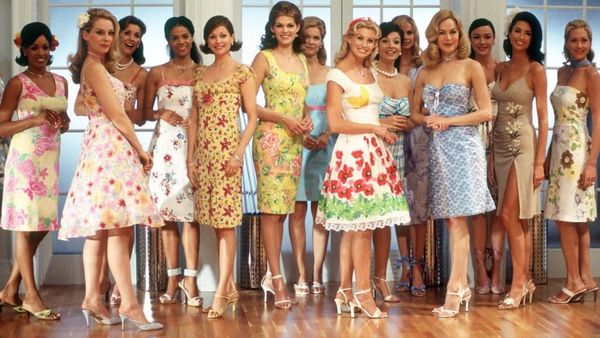Eye For Film >> Movies >> The Stepford Wives (2004) Film Review

Opening with a perfectly judged title sequence showing Fifties visions of happy housewives in futuristic homes, this updated version of the 1975 classic features some superb design work and glorious camp, but is ultimately too artificial for its own good. The usually reliable Nicole Kidman is woefully miscast as Joanna, Stepford's newest resident, who comes to suspect that the perfect bimbo homemakers who make up the rest of the female population are in fact robots. Whilst she's physically well suited to the part, able to look masculine, feminine or mechanical according to the demands of the plot, she's never warm and human enough to make us care, and the vital chemistry between her character and husband Walter (Matthew Broderick) is entirely absent. This inadvertently says more about modern sexual politics than the cheesily reconstructed story has a hope of doing.
In this 21st century Stepford world, there are no natural housewives; we are invited to be horrified on behalf of the women there because they were all previously high-powered executives. This is offered as part-justification for their husbands' actions, undermining Ira Levin's original comments on human nature, and it seems to suggest that the naturally compliant are deserving of no pity at all.
Just to make sure we know where we stand, the film opens with an awful prologue about Joanna's days as a network television executive, with digs at reality TV and cheap battle-of-the-sexes entertainment which are just too badly put together to provide satisfying parody. Opportunities for wit are squandered, signalling early on that this is all about camp and has nothing real to say. The original's careful balance between cheesiness and creepiness is lost. It is worth enduring these early scenes, however, because much of the later camp is very well handled, and there's quite a bit of unexpected humour.
The other big change to the main part of the story comes with the introduction of a gay couple, with Roger Bart conveniently filling the disposable best friend role. This enables the film to deal with gay politics and gender issues too, albeit only on the shallowest level. Once again, one has the feeling that something incisive could have been done with this, but the chance is wasted. Nevertheless, Bart brings a touch of much-needed warmth, and works well alongside Bette Midler as the unruly writer Bobbie.
The Stepford Wives is one of those rare films which uses cinematic and literary reference well, building in lots of little jokes which contribute to the atmosphere without interrupting the story. So much good work has been put into this that it seems an even greater shame - albeit a predictable one - that it hasn't had the guts to stay true to its own origins. The shot which ended the original retains its power, but a secondary ending, tacky, sentimental and disappointingly low on violence, has been added.
If there is one reason remaining to go and see this film, it's Glenn Close. The finest pantomime villain working in Hollywood, she gives a performance of such ferocious magnitude that it fairly blows her co-stars - even Christopher Walken - offscreen. She is the only possible justification for the final scenes; to see her crawling across the floor like the Terminator in a big yellow dress makes it all worthwhile. This is political science fiction reduced to trash, but if one is going to do trash, one should at least do it well.
Reviewed on: 11 Jul 2007




















